2024-09-27:
18 September 2024, through the procedural order UPC_CFI_8/2023, the Nordic-Baltic Regional Division of the Unified Patent Court (UPC) delivered a decision on a request for public access to the pleadings and evidence in several cases involving Edwards Lifesciences Corporation and various defendants. The request was made by an individual in his capacity as a board member and investor in a medical device company.
Applicant’s Request:
The individual requested access to all pleadings and evidence as a member of the public, citing his interest as a competitor in the cardiac implant technology field. His concern was the validity of the patent related to a third-party product under development that might be similar to the allegedly infringing products of the defendants.
Claimant’s/Defendants’ Objections:
-
- 1. Edwards Lifesciences opposed the request, arguing that it lacked a concrete, verifiable, and legitimate reason. They noted that the individual had not mentioned his involvement in any medical company in his initial application.
- 2. Edwards Lifesciences also requested dismissal, arguing that the request did not comply with Rule 262.1(b) RoP. They stressed the need to protect the integrity of the proceedings and sought to keep the information confidential.
The Court’s Grounds for Decision:
Public Access Principle
The court acknowledged the importance of public scrutiny and access to court procedures, rooted in democratic principles and the rule of law. Article 45 UPCA and Article 47 of the Charter of Fundamental Rights of the European Union support public access unless confidentiality is necessary for the interests of the parties or the general interest of justice.
Balancing Interests
The court recognized the general public interest in accessing written submissions and evidence, which aids in understanding court decisions and maintaining public confidence in the judicial system.
Specific Request Analysis
The court found the request too general and that it lacked specificity regarding the pleadings and evidence sought. The court noted that the detailed descriptions of the patents in question were already public, thus the pleadings and evidence would not add new information.
Integrity of Proceedings
The court emphasized the necessity of protecting the integrity of ongoing proceedings, allowing parties to present their arguments and evidence independently and without external influence. The court determined that granting access at this stage could compromise this integrity.
Timing of Access
The court suggested that public access to pleadings and evidence is more appropriately granted after the proceedings have concluded, balancing the interests of transparency and procedural integrity.
Decision:
(i) The court denied the individual’s request for access to the pleadings and evidence, prioritizing the integrity of the ongoing proceedings over the asserted public interest.
(ii) The request for confidentiality raised by the parties was not addressed, as the access request was rejected.
(iii) Leave to appeal was granted, acknowledging the general interest in clarifying the interpretation of the law.
(iv) The applicant was ordered to bear the costs of the proceedings, with the option to decide costs and damages in separate proceedings upon request.
Conclusion: The procedural order underscores the UPC’s principle of balancing transparency with the need to protect the integrity of ongoing legal proceedings. The decision reflects a careful consideration of public access principles against the specific interests and procedural safeguards in patent litigation cases.
Text: Joakim Wihlsson
Source: The Unified Patent Court

